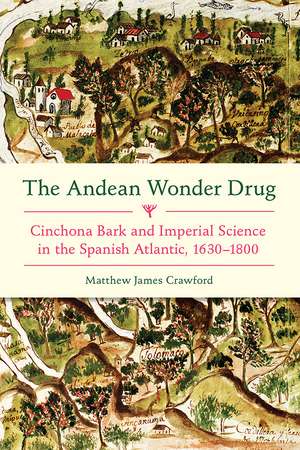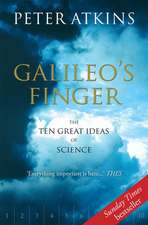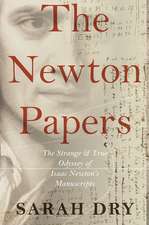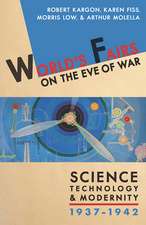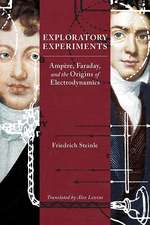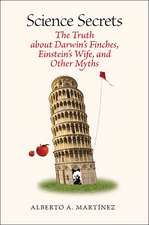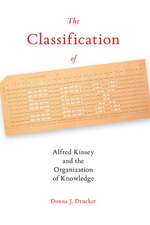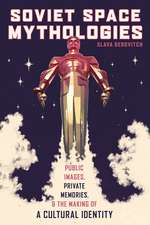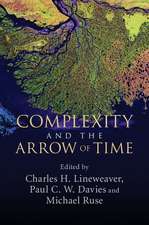The Andean Wonder Drug: Cinchona Bark and Imperial Science in the Spanish Atlantic, 1630-1800
Autor Matthew James Crawforden Limba Engleză Hardback – 12 mai 2016
In the eighteenth century, malaria was a prevalent and deadly disease, and the only effective treatment was found in the Andean forests of Spanish America: a medicinal bark harvested from cinchona trees that would later give rise to the antimalarial drug quinine. In 1751, the Spanish Crown asserted control over the production and distribution of this medicament by establishing a royal reserve of “fever trees” in Quito. Through this pilot project, the Crown pursued a new vision of imperialism informed by science and invigorated through commerce. But ultimately this project failed, much like the broader imperial reforms that it represented. Drawing on extensive archival research, Matthew Crawford explains why, showing how indigenous healers, laborers, merchants, colonial officials, and creole elites contested European science and thwarted imperial reform by asserting their authority to speak for the natural world. The Andean Wonder Drug uses the story of cinchona bark to demonstrate how the imperial politics of knowledge in the Spanish Atlantic ultimately undermined efforts to transform European science into a tool of empire.
Preț: 426.79 lei
Nou
Puncte Express: 640
Preț estimativ în valută:
81.69€ • 84.18$ • 68.96£
81.69€ • 84.18$ • 68.96£
Carte disponibilă
Livrare economică 10-24 februarie
Preluare comenzi: 021 569.72.76
Specificații
ISBN-13: 9780822944522
ISBN-10: 0822944529
Pagini: 336
Ilustrații: 7 b&w illustrations
Dimensiuni: 152 x 229 x 25 mm
Greutate: 0.54 kg
Ediția:1
Editura: University of Pittsburgh Press
Colecția University of Pittsburgh Press
ISBN-10: 0822944529
Pagini: 336
Ilustrații: 7 b&w illustrations
Dimensiuni: 152 x 229 x 25 mm
Greutate: 0.54 kg
Ediția:1
Editura: University of Pittsburgh Press
Colecția University of Pittsburgh Press
Recenzii
"Crawford's scholarly study adds to our knowledge of the history of cinchona and of the Enlightenment, but probably its greatest contribution is to document in detail the relationship between science and empire through showing how knowledge was actually acquired and disseminated on the ground within specific economic and political contexts. It is a model for future studies of this kind and a significant contribution to understanding the nature of early modern science."
—Journal of the History of Medicine
—Journal of the History of Medicine
"Boldly challenges historiographical consensus. Crawford offers a sweeping counternarrative to any simplified account of the rise of scientific modernity as a tool of empire . . . Crawford's illuminating analysis shows that science and knowledge never worked as an outside, adjudicating arbiter."
—History of Science
—History of Science
“Excellently thought out and clearly written. An excellent book.”
—Choice
—Choice
“Instead of taking at face value conventional claims that the natural sciences offered an objective method for evaluating natural resources, Matthew Crawford convincingly shows how scientific assessment actively produced political quarrels about who could determine the efficacy of new drugs and how. The Andean Wonder Drug is a model of colonial science studies that makes essential reading for historians of the Atlantic World and early modern science and medicine.”
—James Delbourgo, Rutgers University
—James Delbourgo, Rutgers University
“Crawford’s expert account of the Spanish Empire’s struggles to control the cinchona tree and its bark reveals profound links between science, politics, and knowledge production in the Atlantic World. This book is an impressive contribution to existing scholarship on early modern science, early modern Spain, and Atlantic World history. Very interesting, well documented, and fun to read.”
—Antonio Barrera, author of Experiencing Nature: The Spanish American Empire and the Early Scientific Revolution
—Antonio Barrera, author of Experiencing Nature: The Spanish American Empire and the Early Scientific Revolution
“The Andean Wonder Drug is an illuminating study of the Spanish Empire’s efforts to secure monopoly control over the cinchona tree and its bark. The project ultimately failed, but Crawford’s deft analysis offers fresh perspectives into the intimate relationship between early modern sciences and empires, local and global knowledge, and the agents involved in the production of knowledge about quina within the early modern Spanish Atlantic World. At its core, this meticulous analysis is a studied reflection on the question of ‘who speaks for nature?’”
—Susan Deans-Smith, University of Texas at Austin
—Susan Deans-Smith, University of Texas at Austin
“In this compact volume, Crawford brings together a remarkable array of primary sources, including many previously overlooked late eighteenth-century materials. In the process, he reveals how traditional Andean healers, labourers who harvested the bark, elite creole merchants, European explorers and travelers, Royal pharmacists, scientists and medical practitioners - through their various perspectives and specialized knowledge - all contributed to the epistemic understanding of cinchona. . . . Crawford compellingly illuminates the interconnections, as well as the fault lines, among science, commerce, and empire.”
—European History Quarterly
—European History Quarterly
Notă biografică
Matthew James Crawford is assistant professor of history at Kent State University.
